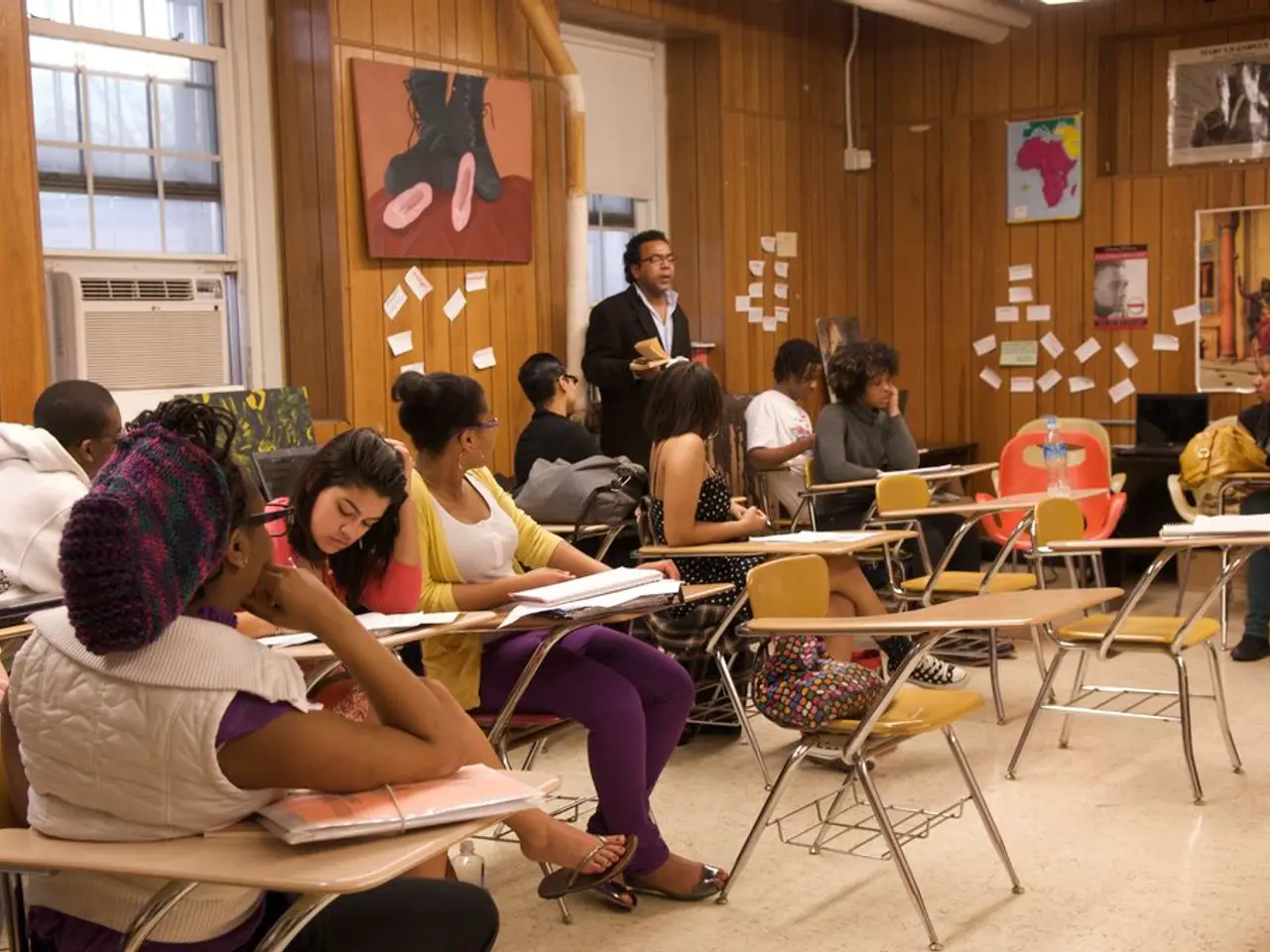Assessment Methods Gleaned from an AI Grading System Evaluating Millions of Scholars Worldwide
In the heart of India, a technological revolution is taking place in early childhood education. Rocket Learning, a New Delhi-based edtech and childhood nonprofit, is spearheading this revolution, partnering with over 200,000 daycares in ten Indian states to deliver a comprehensive learning program.
At the core of this program is an AI grading tool, which corrects student work on digital homework. This tool, developed with a $1.5 million Google.org grant, is not just a digitization tool but a building block for inclusive, adaptive systems. It identifies hands holding up two fingers using a digital sketching tool, demonstrating its versatility.
The accuracy of this AI tool ranges from 90% to 95%, and while some errors may occur, it is not considered a major issue. In fact, informing students that wrong answers can happen is part of the experience, encouraging more interactions between students and human educators.
This tool is more than just a grading system; it is a personalized learning companion. It adjusts lessons dynamically based on each child's individual learning pace, digitally storing creative work (drawings, poems) for continuous monitoring of development. This approach enables higher engagement and support from parents, as children show enthusiasm in learning activities.
Rocket Learning also aims to incorporate AI for holistic development tracking, including nutrition and health metrics integrated via government platforms. This comprehensive approach highlights several lessons for U.S. educators:
- Personalization at scale: AI can provide tailored instruction that meets diverse learner needs in early childhood settings, a critical phase for cognitive and social development.
- Comprehensive progress monitoring: Digitally tracking creative and academic output enables continuous formative assessment instead of solely relying on standardized testing.
- Parental engagement: Demonstrating clear, data-backed progress can motivate caregivers to support learning at home.
- Digital inclusion: Prioritizing access in underserved communities ensures AI benefits are equitably distributed.
- Teacher empowerment: AI tools should be accompanied by professional development on ethical and effective usage, shifting teachers toward the role of learning coaches interpreting AI-driven insights.
Moreover, AI grading technology in India’s diverse educational contexts often blends assessments with real-time analytics and feedback loops, offering lessons in building responsible AI frameworks that align with local curricula and cultural sensitivities. U.S. educators can adapt these models by integrating adaptive assessments, employing AI to generate practical, contextualized questions, and using AI insights to reduce educators’ administrative workload.
Rocket Learning's philosophy behind the grading tool is not to let the perfect be the enemy of the good. The nonprofit plans to make exercises available in English and other languages in the future, ensuring accessibility for all. The AI worksheet grading tool is open source, encouraging collaboration and innovation in the education sector.
Sunil, the founder of Rocket Learning, believes that AI technology, particularly generative AI, has a lot of potential to help low-income students and students in general. He envisions a future where Large Language Models (LLMs) create generative experiences that save human time and effort. However, he notes that edtech has been shy about using generative AI, and with the right design, edtech can start leading this revolution rather than living through it.
In conclusion, the early adoption of AI grading tools like Rocket Learning’s in India showcases how AI can enhance pedagogical practices from early childhood onward, offering scalable, equitable, and personalized education solutions with parallel relevance for U.S. educational systems seeking to modernize classroom assessment and learning support.
[1] India’s Rocket Learning is using AI to personalize education [2] Rocket Learning: Using AI to Personalize Learning for India's Youngest Students [3] How Rocket Learning is Using AI to Enhance Early Childhood Education [4] Rocket Learning: AI for Early Childhood Education [5] Rocket Learning: The AI-Powered Early Education Revolution in India
- The AI grading tool at the heart of Rocket Learning's program adapts lessons dynamically based on each child's individual learning pace, making it a personalized learning companion.
- Rocket Learning's comprehensive learning program, delivered to over 200,000 daycares in ten Indian states, includes an AI tool for grading student work on digital homework.
- The AI tool developed by Rocket Learning identifies hands holding up two fingers using a digital sketching tool, demonstrating its versatility in various tasks.
- The accuracy of Rocket Learning's AI tool ranges from 90% to 95%, and although some errors may occur, it encourages more interactions between students and human educators.
- Rocket Learning aims to incorporate AI for holistic development tracking, including nutrition and health metrics integrated via government platforms, highlighting the potential benefits of AI in education and self-development.




